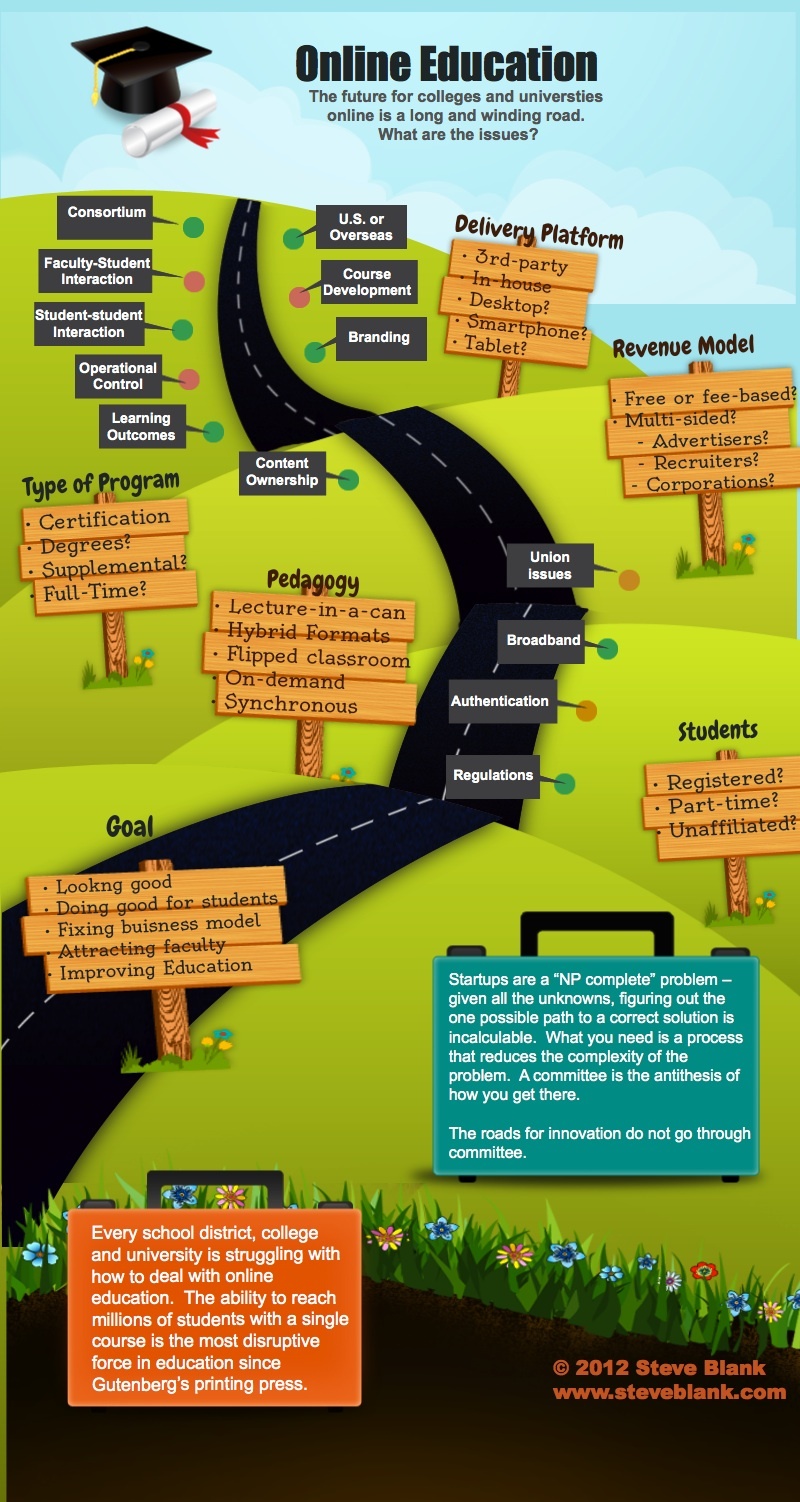I was reminded how innovation dies when the email below arrived in my inbox. It was well written, thoughtful and had a clearly articulated sense of purpose. You may have seen one like it in your school or company.
Skim it and take a guess why I first thought it was a parody. It's a classic mistake large organizations make in dealing with disruption.
The Strategy Committee
Faculty and Staff: We believe online education will become increasingly important at all levels of the educational experience. If our school is to retain its current standards in terms of access and excellence we think it is of paramount importance that we develop an overarching campus strategy that enables and supports online innovation.We Can Figure it Out in A Meeting
We believe our Departments play an essential leadership role in the design and implementation of online offerings. However, we also want to provide guidance and support and ensure that campus goals are met, specifically ensuring that our online education efforts align with our mission, values and operational requirements.
To this end, we are convening a Strategy Committee that is charged with overseeing our efforts and accelerating implementation. The responsibilities of the group will be to provide overall direction to campus, make decisions concerning strategic priorities and allocate additional resources to help realize these priorities. Because we anticipate that most of the innovation in this area will occur at the school/unit level we underscore that the purpose of the Strategy Committee is to provide campus-level guidance and coordination, and to enable innovation. The Strategy Committee will also be responsible for reaching out to and receiving input from the Presidents Staff and the Faculty Senate.
The Strategy Committee will be comprised of Mark Time, Nick Danger, Ralph Spoilsport, Ray Hamberger, Audrey Farber, Rocky Rococo, George Papoon, Fred Flamm, Susan Farber, and Clark Cable.
A Policy Team, which is charged with coordinating with the schools/unit to develop detailed implementation plans for specific projects, will report to the Strategy Committee. The role of the Policy Team will be to develop a detailed strategic framework for the campus, oversee the development of shared resources, disseminate best practices, create an administrative infrastructure that provides consistent financial and legal expertise, and consult with relevant campus groups: and the the Budget Office. The Policy Team will be led by two senior campus leaders, one from the academic side and one from the administration side.
We are extremely pleased that Dean Tirebiter has accepted the administrative lead role of the Policy Team. Dean Tirebiter brings to this position a deep knowledge of the online environment. He will be helping to identify a member of our Faculty to serve as the academic lead of the Policy Team.
The Strategy Committee will be meeting for a half-day retreat at Morse Science Hall in the coming weeks to begin work. We will be sending out an update to faculty and following this retreat, so stay tuned for further updates.
Sincerely,
President Peter Bergman
The memo sounds thoughtful and helpful. It's an attempt to get all the "right" stakeholders in the room and think through the problem.
One useful purpose a university committee could have had was figuring out what the goal of going online was. It could have said "the world expects us to lead so lets get together and figure out how we deal with online education." Our goal(s) could be:
- Looking good
- Doing good for all [or at least citizens of California]
- Doing well by our enrolled students
- Fixing our business model to fix our budget crisis
- Having a good football team - or at least filling the stadium
- Attracting donations
- Attracting faculty
- Oh and yes -- building an efficient, high quality education machine
The problem is that the path to implementing online education is not known. In fact, it's not a solvable problem by committee, regardless of how many smart people in the room. It is a "NP complete" problem - it is so complex that figuring out the one possible path to a correct solution is computationally incalculable. (See the diagram below.)

Innovation Dies in Conference Rooms
The "let's put together a committee" strategy fails for three reasons:
- Online education is not an existing market. There just isn't enough data to pick what is the correct "overarching strategy."
- Making a single bet on a single strategy, plan or company in a new market is a sure way to fail. After 50 years even the smartest VC firms haven't figured out how to pick one company as the winner. That's why they invest in a portfolio.
- Committees protect the status quo. Everyone who has a reason to say "No" is represented.
- Dealing with disruption is not solved by committee. New market problems call for visionary founders, not consensus committee members.
In a perfect world, the right solution would be a one page memo encouraging maximum experimentation with the bare minimum of rules (protecting the schools brand and the applicable laws.)
Lessons Learned
- Innovation in New markets do not come from "overarching strategies"
- It comes out of opportunity, chaos and rapid experimentation
- Solutions are found by betting on a portfolio of low-cost experiments
- With a minimum number of constraints
- The road for innovation does not go through committee

No hay comentarios:
Publicar un comentario